


If you’re squeezing sleep into your busy schedule like it’s just another task on your to-do list, you might want to think twice. For some, getting less than seven hours is more than enough sleep but for others, it may be insufficient. So, then is 6 hours of sleep enough, or should you stick to a recommended sleep duration?
Keep reading to find out if it is truly enough for everyone or just for some people.
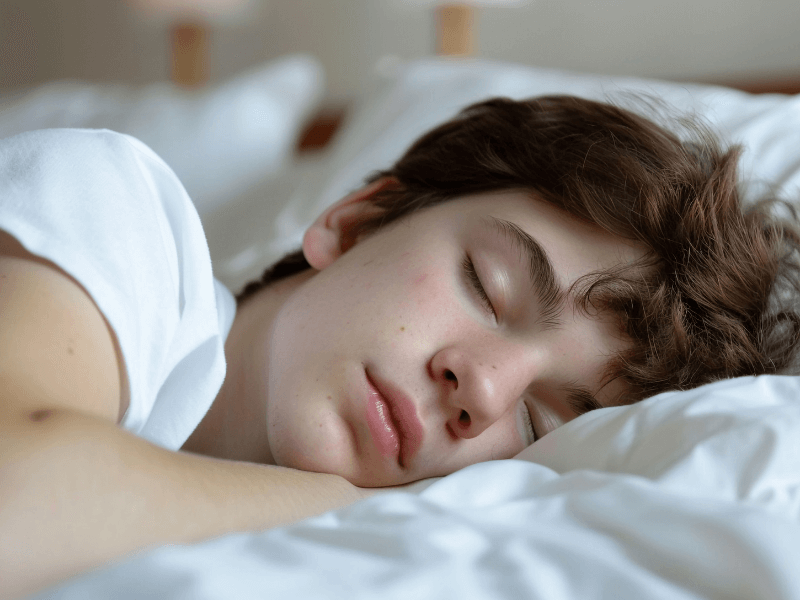
Sleep is one of the most important functions for maintaining good health and well-being. Getting enough sleep helps to support healthy brain function and maintain your physical health. It affects your heart and circulatory system, metabolism, respiratory system, and immune system [1].
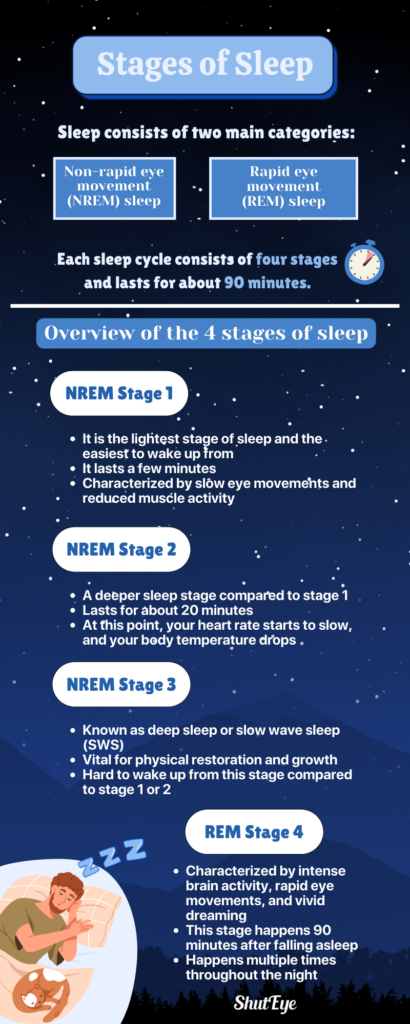
Sleep consists of two main categories— non-rapid eye movement (NREM) sleep and rapid eye movement (REM) sleep. Each sleep cycle typically lasts about 90 minutes and consists of four stages, which repeat throughout the night.
Here is an overview of the four stages:
For the full details on the stages of sleep, check out: Stages of Sleep: What Happens In Each Phase of Sleep Cycles
According to sleep experts, a healthy adult should get an average of 7 to 9 hours of sleep a night. This is based on studies that suggest adults who sleep less than 7 hours may have more health problems [2].
Here are some benefits of sleeping between 7 to 9 hours:
Regarding the recommended amount of sleep, most people need 7 or more hours per night to feel their best. However, some individuals, known as short-sleepers, can function well with less than six hours – sometimes as little as four hours of sleep a night. These short-sleepers are rare, and it’s important to note that they aren’t the norm [3].
Although unique, shouldn’t be seen as a benchmark for how much sleep you need. Most individuals still require the recommended amount of sleep to perform at their best. In some cases, you may need more sleep if you are sleep-deprived or are sick, to feel well-rested.
Getting the right amount of sleep is essential for your health and well-being. The amount of sleep you need depends on your age. Here’s an infographic of how much sleep each age group should aim for:
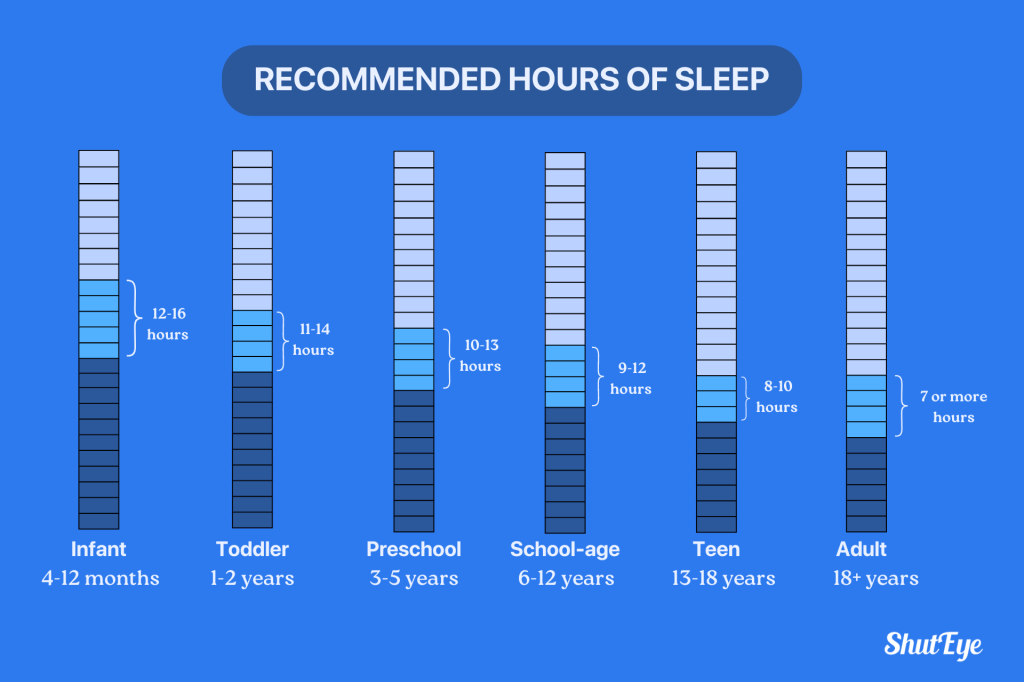
To avoid the effects of sleep deprivation, adults must achieve the recommended sleep duration of seven to nine hours. Although you can get by on less sleep, lack of sleep may lead to fatigue, problems with thinking and concentration, and various health issues. Contrary to popular belief, getting six hours of sleep isn’t enough for most age groups. Prioritizing sleep is crucial for your overall health and well-being.
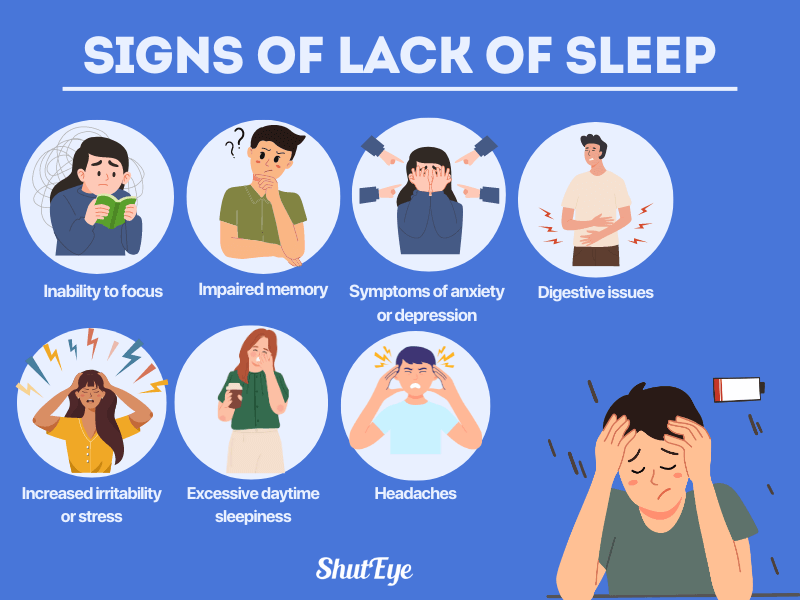
When you are consistently not getting enough sleep, you will start to show signs of sleep deprivation. The most common signs are [4]:
Consistently experiencing these signs is a strong indication that your body is not getting the restorative sleep it needs to function optimally.
Not getting enough sleep is a result of multiple factors like lifestyle, occupational, and sleep disorders. If you are someone who does shift work, has jet lag, or dealing with sleep disorders such as insomnia, narcolepsy, restless leg syndrome, or circadian rhythm disorders, you are likely to suffer from sleep loss [5].
Besides that, poor sleep hygiene, irregular sleep schedules or an uncomfortable sleep environment are contributing factors.
Sleep deprivation can have a huge impact on your cardiovascular, endocrine, immune, and nervous systems.
Some of the consequences on health are the following:
Getting a good night’s sleep is crucial for our health and well-being. It’s not just about the number of hours we sleep but also the quality of our sleep that matters. Sleep quality refers to how deep and restorative our sleep is, including the different stages of non-REM and REM sleep stages.
For adults, it’s recommended to have at least seven hours of sleep each night. During this time, our bodies go through three to five sleep cycles, which are necessary to feel refreshed and energized. However, disrupted or abnormal sleep patterns can negatively impact sleep quality and lead to sleep deprivation.
To prevent sleep deprivation, you need to focus on getting more sleep at night which can be done by fixing your sleep habits. This is often much easier said than done but taking small, consistent steps can make a big difference.
Below are 6 tips to help you get started.
Establishing a consistent sleep schedule is key to achieving quality sleep. Go to bed and wake up simultaneously every day, even on weekends helps regulate your body’s internal clock, known as the circadian rhythm.
Doing this consistently sends a signal to your brain when it is time to feel sleepy and when it is time to wake up. Eventually, this makes it easier to fall asleep and wake up refreshed.
To find out the best time to sleep or wake up for your age, try out our free sleep calculator today.
Creating a relaxing bedtime routine before bed helps to signal to your body that it is time to wind down and get ready to fall asleep. Activities like reading, taking a warm bath, listening to relaxing sounds or guided meditation can help ease your mind and body.
This relaxed state prepares your body for a restful night’s sleep.
At least one hour before going to bed, you should avoid using your electronic devices. Electronic devices tend to emit blue light which can disrupt the production of the sleep hormone, melatonin.
Instead, opt for relaxing, screen-free activities that help your mind unwind. This can help you to fall asleep faster and enjoy a deeper sleep.

Consuming caffeine, energy drinks, or large, heavy meals too close to bedtime can disrupt your sleep. Stimulants like these keep you awake by stimulating your nervous system while heavy meals can cause indigestion, making it harder for you to sleep.
Try to eat any heavy meals at least a few hours before going to bed and if you are still hungry late at night, opt for light snacks such as crackers or yogurt instead.
Exercise helps reduce stress and anxiety, promotes deeper sleep, and can even help you fall asleep faster. Aim for at least 30 minutes of moderate exercise most days of the week. However, avoid intense exercise close to bedtime, as it can energize your body and make it harder to relax.
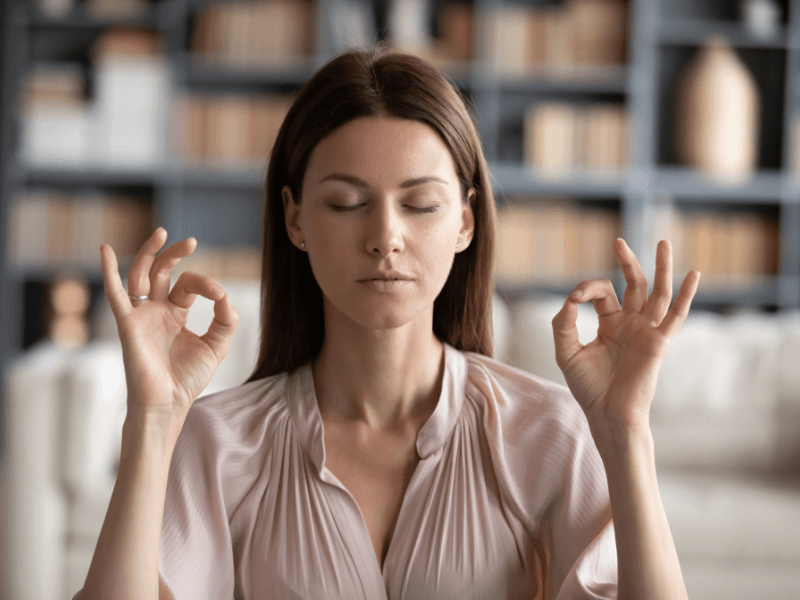
Managing stress is crucial for sleep. High levels of stress can negatively impact your sleep. Find healthy ways to manage stress, such as practicing relaxation techniques, engaging in hobbies, or seeking support from loved ones or a therapist.
If you find that all of these tips still seem to not help you sleep well, you might want to consider taking sleep supplements or seeking help from a sleep specialist. A sleep specialist is better equipped to understand the cause behind your sleep problems and form a treatment plan for you.
In conclusion, six hours of sleep may not be enough for most people to function well. Sleep is vital to our overall health and well-being; inadequate sleep can have serious consequences.
While there may be exceptions, most individuals require more than six hours of sleep to function at their best. To start sleeping better at night, try our patented sleep-tracking app, ShutEye®. The ShutEye® app offers personalized insights and recommendations to help you optimize your sleep quality.
American Academy of Sleep Medicine (2017) Short sleepers and long sleepers [online]. Available at: https://sleepeducation.org/short-sleepers-long-sleepers/
Hanson J.A. and Huecker M.R. (2023) Sleep Deprivation. In: StatPearls [Internet]. Treasure Island (FL): StatPearls Publishing; 2024 Jan-. Available at: https://www.ncbi.nlm.nih.gov/books/NBK547676/
Institute of Medicine (US) Committee on Sleep Medicine and Research; Colten HR, Altevogt BM, editors. (2006) Sleep Disorders and Sleep Deprivation: An Unmet Public Health Problem. Washington (DC): National Academies Press (US); 3, Extent and Health Consequences of Chronic Sleep Loss and Sleep Disorders. Available at: https://www.ncbi.nlm.nih.gov/books/NBK19961/
National Heart, Lung and Blood Institute (2022) How Much Sleep Is Enough? [online]. Available at: https://sleepeducation.org/short-sleepers-long-sleepers/
National Heart, Lung and Blood Institute (2022) Why Is Sleep Important? [online]. Available at: https://www.nhlbi.nih.gov/health/sleep/why-sleep-important